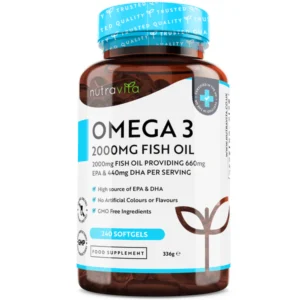In today’s hectic world, maintaining optimal wellbeing can be a challenge. However, integrating omega 3 supplements into your daily routine can significantly enhance your health and vitality. Whether you prefer omega 3 capsules or tablets, or if you’re looking for vegan omega 3 options, the UK market offers a variety of choices to suit your needs.
Understanding Omega 3 Benefits
Omega-3 fatty acids are essential nutrients that our bodies cannot produce on their own. They play a crucial role in several vital bodily functions, making their intake through diet or supplements essential for maintaining good health. These polyunsaturated fats come in three main types: ALA (alpha-linolenic acid) found in plant oils, and EPA (eicosapentaenoic acid) and DHA (docosahexaenoic acid) found in marine oils. Each type has unique benefits that contribute to overall health and well-being.
Heart Health
Omega-3s support cardiovascular function and may help reduce the risk of heart disease. They achieve this by lowering blood pressure, reducing triglycerides, slowing the development of plaque in the arteries, and reducing the likelihood of heart attack and stroke. Regular consumption of omega-3s can also help maintain healthy cholesterol levels, which is crucial for preventing atherosclerosis, a condition characterized by hardened and narrowed arteries. Studies have shown that people who consume fish regularly, a rich source of EPA and DHA, have a lower incidence of heart disease.
Brain Function
Omega-3 fatty acids are vital for cognitive development and maintaining brain health throughout life. DHA, in particular, is a major structural component of the brain and retina, making it essential for brain function and vision. Adequate DHA levels are associated with improved memory, faster decision-making, and reduced risk of cognitive decline. During pregnancy and early childhood, sufficient omega-3 intake is critical for the neurodevelopment of the fetus and young children. There is also evidence suggesting that omega-3s can help manage and reduce symptoms of depression and anxiety, highlighting their role in mental health.
Inflammation Reduction
Omega-3s have anti-inflammatory properties, benefiting joint health and overall inflammation levels in the body. Chronic inflammation is a contributing factor to many common diseases, including arthritis, heart disease, and certain cancers. Omega-3s help reduce the production of molecules and substances linked to inflammation, such as inflammatory eicosanoids and cytokines. This makes them beneficial for individuals with inflammatory conditions like rheumatoid arthritis, where they can help alleviate symptoms and improve joint mobility.
Additional Benefits
Beyond these primary benefits, omega-3 fatty acids also support eye health by protecting against macular degeneration, a leading cause of vision impairment. They contribute to healthy skin, helping to maintain hydration and combat issues like eczema and acne. Additionally, omega-3s are linked to improved bone health, as they can increase the levels of calcium in the bones, reducing the risk of osteoporosis. Emerging research also suggests a potential role in cancer prevention, particularly breast and prostate cancers, although more studies are needed to confirm these effects.
Dietary Sources
To reap the benefits of omega-3s, it’s important to include rich sources in your diet. Fatty fish like salmon, mackerel, and sardines are among the best sources of EPA and DHA. For those who prefer plant-based options, flaxseeds, chia seeds, and walnuts are excellent sources of ALA. Additionally, fortified foods and omega-3 supplements, such as fish oil or algal oil, can help ensure adequate intake.
In conclusion, omega-3 fatty acids are indispensable for numerous aspects of health. Their wide-ranging benefits from heart health to cognitive function, and anti-inflammatory properties make them a critical component of a healthy diet. By incorporating a variety of omega-3-rich foods into your diet, you can support your body’s overall health and well-being.
Choosing the Best Omega 3 Supplement
When selecting an omega-3 supplement, consider several critical factors to ensure you are getting a high-quality product that meets your nutritional needs and lifestyle preferences.
Quality
Quality is paramount when choosing an omega-3 supplement. Look for products that have been purified to remove contaminants such as mercury, PCBs, and dioxins, which can be harmful if ingested in large amounts. Many reputable brands use molecular distillation or other purification processes to ensure the purity of their supplements. Additionally, checking for third-party testing or certification can provide an extra layer of assurance regarding the product’s safety and quality.
Dosage
Dosage is another crucial consideration. It’s important to check the content of EPA (eicosapentaenoic acid) and DHA (docosahexaenoic acid), the active forms of omega-3s. These components are responsible for the majority of the health benefits associated with omega-3 intake, including supporting heart health, brain function, and reducing inflammation. The dosage should align with your specific health goals or the recommendations of your healthcare provider. Many experts suggest a daily intake of 250-500 mg of combined EPA and DHA for most adults, but individual needs may vary.
Form
The form of the supplement is also an important factor. Omega-3 supplements come in various forms, including capsules, tablets, and liquids. Capsules and tablets are convenient and easy to take, making them a popular choice for many people. However, if you have difficulty swallowing pills, a liquid form might be more suitable. Some people prefer liquid supplements because they can be added to smoothies or other foods, providing more flexibility in how they are consumed.
Source
Source is a key consideration, especially for those with dietary restrictions or preferences. Traditional omega-3 supplements are derived from fish oil, but there are plant-based options available for those who follow a vegan or vegetarian diet. Algal oil is a sustainable and vegan-friendly source of DHA and EPA, offering the same benefits as fish oil without the use of animal products. Ensuring that your supplement aligns with your dietary values can enhance your overall satisfaction with the product.

Vegan Omega 3 Options
For those seeking vegan alternatives, algae-derived omega 3 supplements are an excellent choice. They provide EPA and DHA directly from algae, offering a sustainable and ethical option for omega 3 supplementation.
Explore the best-seller vegan omega 3 supplement here.
Incorporating Omega 3 into Your Routine
To maximize the benefits of omega 3 supplements:
- Consistency: Take your chosen supplement daily to maintain consistent levels of omega 3s in your body.
- Healthy Diet: Complement your supplement with a balanced diet rich in fatty fish, flaxseeds, chia seeds, and walnuts for additional omega 3 sources.
- Consultation: Consult with a healthcare professional to determine the right dosage and monitor any potential interactions with medications.

Conclusion
Incorporating omega 3 supplements into your wellness regimen can have profound benefits for your overall health. Whether you opt for omega 3 capsules, tablets, or prefer vegan omega 3 sources, the key is consistency and quality. Explore the best omega 3 supplement options available in the UK market today to support your journey towards optimal wellbeing.
Enhance your health with omega 3 today and experience the difference it can make in your life!


